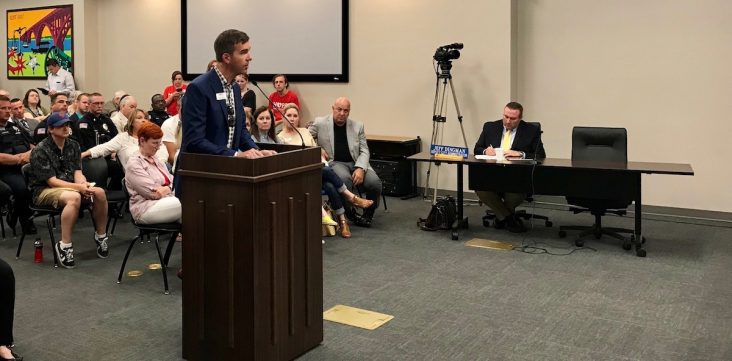Mandatory spay-and-neuter comes back to Board in packed town hall
by September 4, 2018 9:35 pm 1,804 views

HOPE Humane Society Vice President Storm Nolan addresses the Fort Smith Board of Directors.
The five-year dormant issue of mandatory spay-and-neuter in the city of Fort Smith came back around Tuesday night (Sept. 4) at a town hall meeting following the city’s Board of Directors’ regular meeting. More than 100 audience members sat through an agenda that mostly included zoning and administrative requests so they could address the city’s stray pet issue.
HOPE Humane Society Vice President Storm Nolan, speaking on behalf of the group, said the facility had 622 pets as of last Friday in a facility only designed to hold 300.
”Almost all these dogs and cats came from Fort Smith Animal Control,” Nolan said, adding the campus has taken in 1,900 animals so far this year (or 237.5 per month through August).
This rate continues a problem that has been present since at least 2015 when the facility took in 3,160 total animals. The number dipped to 2,620 the following year before hitting 2,858 last year. Per Nolan’s numbers, it’s trending to match last year’s intake. Most of the animals are dogs and cats. Nolan called it “a city problem.”
“It’s not just a Humane Society problem. We’re in this situation because of unwanted litters of puppies and kittens, and that’s a lack of spay-and-neuter. This is not a problem that other parts of our great country share. It’s only the southeast. The difference is they have set the cultural expectation of spay-and-neuter in our communities,” Nolan said.
Nolan refused to consider euthanization as an option. The facility operates under a “no-kill” policy. Nolan said the community as a whole cannot consider euthanization for three reasons.
“First, this is a community that believes in the sanctity of life, and that includes all of God’s animals.” Secondly, “this is a measure of who we are as a community.”
He continued: “This is a quality-of-place question. We will not attract the world-changing companies and individuals to Fort Smith who help move us forward if they see this is how we behave and operate ourselves. Thirdly, and probably most importantly, communities who have adopted common sense solutions like licensing and microchipping their pets aren’t having to euthanize any animals at all.”
Nolan cited Rogers’ 97% flag-and-release rate, Fayetteville’s 7% euthanization rate that applies only to sick or aggressive animals, and a slew of other area cities that embrace measures like licensing and/or microchipping. To that effect, Nolan said the group believed such measures were “the most reasonable, pragmatic, and effective solution.”
Under a possible solution proposed Tuesday night, Nolan recommended no fee for a citizen to register an “altered” (i.e., spayed-or-neutered) dog with the city.
“Unaltered dogs would be subject to something in the range of a $50 annual fee. That’s slightly more than it costs to have a dog altered, and it would be an economic incentive to encourage spay-and-neuter.”
Nolan anticipates pushback from some in the community who would not appreciate being told what to do with their pet, but he called them a “vocal minority,” adding that, while he empathized, “When people start shifting their responsibilities and their burdens to this community, that’s where the government must step in.”
The Board does not take action on town hall items, but Director Tracy Pennartz expressed an interest in updated recommendations from the Animal Services Advisory Board (ASAB). The group brought an 18-page mandatory spay-and-neuter recommendation before the Board over five years ago, but no action was taken. Director Keith Lau did not dismiss the idea but showed concern about finding an economically responsible way to move forward. He also cautioned the problem isn’t one that could be fixed overnight as it would take time to “get the program up and running” and to “educate the citizens” on their responsibilities.
